|
|
|
Sort Order |
|
|
|
Items / Page
|
|
|
|
|
|
|
| Srl | Item |
| 1 |
ID:
068851
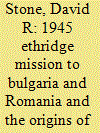

|
|
|
| 2 |
ID:
174490
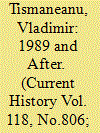

|
|
|
|
|
| Summary/Abstract |
Nations that endured communist dictatorships must come to terms with the traumas of the past before durable democracies can take hold—a lesson the author learned firsthand in Romania.
|
|
|
|
|
|
|
|
|
|
|
|
|
|
|
|
| 3 |
ID:
095018
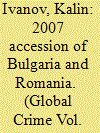

|
|
|
|
|
| Publication |
2010.
|
| Summary/Abstract |
For both objective and subjective reasons, the European Union devoted unprecedented attention to the problem of corruption in Bulgaria and Romania. The European Union (EU) faced a complex challenge in wielding its arsenal of carrots and sticks to encourage reform in the two countries. Conditionality was further complicated by rivalries between Sofia and Bucharest. Despite its limits, EU pressure presented a rare opportunity to depoliticise anti-corruption policy. After accession, Romania regressed from its previous achievements against corruption, and Bulgaria remained reluctant to prosecute senior officials or confront organised crime. Nevertheless, the European Commission continued its monitoring activities, and its ability to freeze funds maintained a modicum of pressure for reform. More effective anti-corruption efforts are possible if a domestic constituency for reform gains sufficient momentum to replace the EU's waning influence.
|
|
|
|
|
|
|
|
|
|
|
|
|
|
|
|
| 4 |
ID:
103527
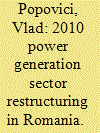

|
|
|
|
|
| Publication |
2011.
|
| Summary/Abstract |
In the spring of 2009, the Romanian government has proposed a restructuring of the national power generation sector segment that is still owned by the state. As most of the power generation capacity is still state-owned, this restructuring will dramatically alter the competitive landscape of this sector. This paper is analyzing the rationale and principles of the restructuring as stated by government documents and officials, the assessment methodology and criteria proposed by the government, as well as the proposed final outcome of the restructuring initiative. Based on this critical assessment and the early results of the restructuring's implementation, we are able to make recommendations that can be considered for a revised restructuring approach.
|
|
|
|
|
|
|
|
|
|
|
|
|
|
|
|
| 5 |
ID:
191768
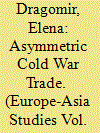

|
|
|
|
|
| Summary/Abstract |
This article investigates Romania’s position towards the creation and functioning of the Generalized System of Preferences (GSP), with a special focus on its interaction with the European Economic Community (EEC). The period under investigation is limited to the 1970s, which was not only the first decade of the implementation of the GSP, but also a time of détente arguably favouring international cooperation and trade. This article argues that Romania did not conceptualise its foreign policy (economic foreign policy included) in terms of East against West, socialism against capitalism or command economy against free market economy but rather in terms of smaller states/powers against bigger states/powers and less developed (poor) countries against developed (rich) countries, regardless of their socio-economic systems and Cold War alliances.
|
|
|
|
|
|
|
|
|
|
|
|
|
|
|
|
| 6 |
ID:
118351
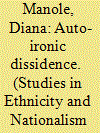

|
|
|
|
|
| Publication |
2012.
|
| Summary/Abstract |
This article analyses and compares the treatment of history in two dramatic re-enactments: the English Canadian 1837: The Farmers' Revolt, a collective creation of Theatre Passe Muraille with Rick Salutin as dramaturge, and the Romanian A Cold, by Marin Sorescu. Both plays re-enact past events as a form of anti-colonial and respectively anti-communist resistance and as a way to enable imagined exile, but their dramaturgical strategies and substance are necessarily different as each deals with a specific order of history.
|
|
|
|
|
|
|
|
|
|
|
|
|
|
|
|
| 7 |
ID:
132897
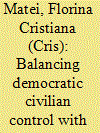

|
|
|
|
|
| Publication |
2014.
|
| Summary/Abstract |
This article reviews Romania's intelligence reform after 1989. Specifically, it looks at intelligence reform before and after Romania's accession to the North Atlantic Treaty Organization (NATO) in 2004, and the European Union (EU) in 2007. It finds that Romania has made considerable progress in intelligence reform. That is because Romania, which expressed its desire and commitment to join NATO/EU after 1989, has worked hard to comply with these organizations' membership demands (including intelligence reform). After NATO/EU integration (when demands on balancing control and effectiveness virtually vanished), despite continued openness efforts made by agencies, control/oversight diluted. Thus, post-NATO/EU, while effectiveness is being strengthened, democratic control lessens.
|
|
|
|
|
|
|
|
|
|
|
|
|
|
|
|
| 8 |
ID:
118580
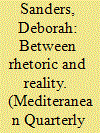

|
|
|
|
|
| Publication |
2012.
|
| Summary/Abstract |
As a powerful littoral state with important security interests in the Black Sea, Russia has the ability to use the maritime domain to advance and protect its interests, which will affect regional and international security. Using the currently available literature, this essay examines the three factors that shape and affect Russia's maritime power in the Black Sea: quantitative factors such as the number and capability of maritime platforms as well as access to maritime infrastructure; qualitative factors such as the morale of maritime personnel; and the strategic context in which Russia exercises its maritime power. It argues that Russian maritime power is likely to decline significantly. Not only will Russia have significantly fewer maritime platforms in the future, but its ability to use the maritime domain will be compromised by qualitative problems and poor relations with the United States and littoral states such as Georgia and Romania.
|
|
|
|
|
|
|
|
|
|
|
|
|
|
|
|
| 9 |
ID:
178658
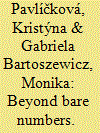

|
|
|
|
|
| Summary/Abstract |
This paper closely scrutinises NATO engagement, particularly the The Eastern Flank countries in the Middle East. Our main argument is that the quantitative approach to free riding is useful only when it comes to black-and-white policy choices and either-or policy decisions. Simultaneously, it fails when we are faced with more complex situations in which evaluations go beyond the very simple numerical markers, such as the 2% threshold of defence spending. By bringing together a unique regional focus (the European East and the Middle East), theoretical dilemmas (free-riding) and policy issues (NATO's multilateral framework of co-operation understood in terms of strategic interests and practical engagement), we are able to show that Romania is a subtle free rider, which cannot be verified by merely looking at numbers alone, but can be ascertained by a careful qualitative analysis which reveals a discrepancy between the country's strategic interests and its level of engagement.
|
|
|
|
|
|
|
|
|
|
|
|
|
|
|
|
| 10 |
ID:
132436
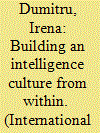

|
|
|
|
|
| Publication |
2014.
|
| Summary/Abstract |
Collective perceptions on intelligence services have been for centuries associated with a sense of mystery, obscurity, and clandestine behavior. At the same time, intelligence success could not be traditionally conceived and exercised in the absence of cover, duplicity, truth manipulation, and intentional avoidance, as well as of masks adapted to context. Therefore, intelligence would traditionally be based on secrecy and a mainly "no communication" approach. Thus, secrecy inherently marked intelligence, as both a barrier created from inside the organization towards the outside world and as a label placed by public opinion on the intelligence organization, therefore shaping knowledge of what cannot otherwise be known.
|
|
|
|
|
|
|
|
|
|
|
|
|
|
|
|
| 11 |
ID:
083385


|
|
|
|
|
| Publication |
2008.
|
| Summary/Abstract |
In 2001-2004 Bulgaria and Romania led internationally sponsored small arms and ammunition destruction. A few years later, they all but disappeared from destruction discussions. How to explain the enigma of these two countries' initial and large-scale action and their later hesitation? Both cases reveal the importance of external actors in small arms disarmament, in this case, especially the United States. It was Washington that created the initial demand for weapons destruction, as well as later export demands through war in Afghanistan and Iraq. While host authorities in Bulgaria and Romania may want to destroy at least part of their surplus stocks, they seem unwilling to make significant investments of their own. Convincing them to take ownership of the problem and solutions must be the next major objective of donor countries. The two countries are far from identical. Bulgaria has been more transparent, making informative reports on small arms policy to the United Nations and aiding foreign research into its small arms situation. It has shown somewhat greater interest in the disposal of surplus stocks, designating weapons for future destruction. Romania has been considerably more secretive; only limited information has been made available and the future of its weapons policies is much more obscure. But Romania has created a more reliable basis for future surplus destruction by reducing its armed forces more dramatically, especially its reserve rolls. Bulgaria seems more likely to resume destruction of surpluses, but Romania is likely to eliminate more when it gets around to it.
|
|
|
|
|
|
|
|
|
|
|
|
|
|
|
|
| 12 |
ID:
129210
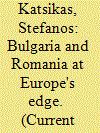

|
|
|
|
|
| Publication |
2014.
|
| Summary/Abstract |
Bulgaria and Romania joined the European Union as full member states on January 1, 2007. This momentous event was the culmination of a long and demanding political project that has often been described as "Europeanization." Although the foundations of this project were laid fairly soon after the fall of both countries' communist regimes in 1989, the pace was slow, and did not really gain momentum
until the end of the 1990s. Over the years the project ebbed and flowed, but what kept both nations committed was their strong belief that joining the EU would fill the political, economic, and security vacuum that the dissolution of the communist bloc had produced. EU membership was popularly seen as a panacea that would allow Bulgaria and Romania to stabilize their newborn democratic systems and overcome the economic problems of the postcommunist transition. It offered confirmation that the Bulgarians and Romanians were really Europeans. Seven years later, however, rather than feeling pulled into the heart of Europe, Bulgaria and Romania find themselves at the edge. Their EU partners raise questions about their commitment to the rule of law and their willingness to crack down on organized crime and illegal immigration. Does this mean that membership has not been an easy route to democratic stability, economic growth, and greater opportunity for all? European integration may be a difficult topic at a time when economic crisis has, for some, cast the entire effort into doubt. But the situation of Romania and Bulgaria lends itself to reflection on the wider project and its overall historical importance.
|
|
|
|
|
|
|
|
|
|
|
|
|
|
|
|
| 13 |
ID:
090546
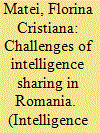

|
|
|
|
|
| Publication |
2009.
|
| Summary/Abstract |
The twenty-first century's security environment has triggered a phenomenon of 'proliferation' of intelligence and security cooperation, both domestically and internationally. After the ousting of the communist regime (whose intelligence system served the regime) in 1989, Romania embarked upon democratic reform of its new intelligence system (including strengthening cooperation), to better tackle the current security challenges. This has been a rather onerous process, yet worthwhile: Romania's intelligence is presently cooperating well with national and international partners, to counter national, regional, and global security threats. This paper assesses Romania's efforts in developing intelligence cooperation, after the demise of the communist regime.
|
|
|
|
|
|
|
|
|
|
|
|
|
|
|
|
| 14 |
ID:
090660
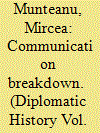

|
|
|
|
|
| Publication |
2009.
|
| Summary/Abstract |
During the August 2, 1969, discussion between Nixon and Ceausescu in Bucharest, the U.S. president's interest in gauging the exact latitude the Romanians had was apparent. Several times Nixon reiterated U.S. interest in maintaining Romania's independent position within the Soviet bloc and voiced concern that the close U.S.-Romanian relations could cause Moscow to place undue pressure on Bucharest. Ceausescu and Prime Minister Ion Gheorghe Maurer, however, dismissed Nixon's concern, confident that they would be able to continue the balancing act between signaling their differences with Moscow and stressing their similarities.
|
|
|
|
|
|
|
|
|
|
|
|
|
|
|
|
| 15 |
ID:
111586
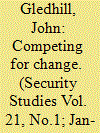

|
|
|
|
|
| Publication |
2012.
|
| Summary/Abstract |
When collective violence breaks out during periods of regime change, the root cause of that violence is ordinarily assumed to be a failure of state and/or governmental organizations, alongside transition. However, there are limits to the applicability of this understanding, since violence sometimes erupts during regime change, even when state and executive organs remain intact. This paper addresses those puzzling cases, by arguing that transitional violence can be a by-product of competition between, or within, a state's security services-for power and resources in an emerging regime. Competition develops where there is intense uncertainty about the form that the new regime might take and associated uncertainty about the distribution of power and state funds among state security services within that regime. The dynamics of transitional violence through intrastate competition are illustrated in the paper through treatment of two "most different" cases: Indonesia (1998) and Romania (1990).
|
|
|
|
|
|
|
|
|
|
|
|
|
|
|
|
| 16 |
ID:
077249
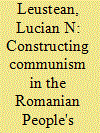

|
|
|
|
|
| Publication |
2007.
|
| Summary/Abstract |
This article analyses the ambiguous and contradictory relationship between the Orthodox Church and the communist regime during the first two years of the Romanian People's Republic. The installation of communism and the process of Stalinisation led to an unprecedented control of the church. The church was actively employed in propaganda and the regime imposed its own people in the hierarchy. On the one hand, Romanian communists followed the Soviet model regarding the place of the church in the communist state while, on the other hand, the church hierarchy adapted to the new political system by creating a theory of 'social apostolate'. Lacking popular support, the communists used the church as an instrument through which they could acquire the political support of the masses. The church thus enjoyed a favoured position in society mainly because the communists employed it in their ideological expansionism and confrontation with the West
|
|
|
|
|
|
|
|
|
|
|
|
|
|
|
|
| 17 |
ID:
102706
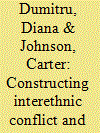

|
|
|
| 18 |
ID:
061855
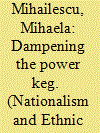

|
|
|
| 19 |
ID:
044731
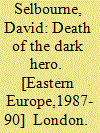

|
|
|
|
|
| Publication |
London, Jonathan Cape, 1990.
|
| Description |
xiii, 274p.Hbk
|
| Standard Number |
0224027921
|
|
|
|
|
|
|
|
|
|
|
|
Copies: C:1/I:0,R:0,Q:0
Circulation
| Accession# | Call# | Current Location | Status | Policy | Location |
| 032343 | 947/SEL 032343 | Main | On Shelf | General | |
|
|
|
|
| 20 |
ID:
119614
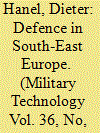

|
|
|
|
|
| Publication |
2012.
|
| Summary/Abstract |
After the collapes of Soviet Union in 1991, the disintegration of Yugoslavia in 2002, and EU and NATO enlargement, South-East Europe became a region characterised by fundamental political, economic and military change.
|
|
|
|
|
|
|
|
|
|
|
|
|
|
|
|
|
|
|
|
|